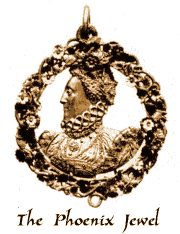Precedence, Preferment, and Attainder
Precedence refers to your rank, either above or below (or before or after) other people. An earl takes precedence over a baron, a baron over a knight, and so on. That is to say, he goes into dinner first, or gets his head cut off first; whatever.
Unmarried women take precedence from their fathers; married women from their husbands, with some exceptions. A widowed countess who marries a mere knight, however, is permitted in courtesy to retain the title of Countess, though her husband does not become an earl, unless by royal grant.
 Strictly, precedence depends on birth (or marriage), not on
money, land, or popularity with the Queen.
Strictly, precedence depends on birth (or marriage), not on
money, land, or popularity with the Queen.
For those of equal station, precedence depends on the date of creation, not what "number" you are.
Date of creation is the year in which that title came to the family. The 3rd Earl of Derby (1485) out-ranks the 3rd Earl of Sussex (1529) who out-ranks the 3rd Earl of Southampton (1547).
The numbers start over if the title goes to a new family: William FitzWilliam, 1st Earl of Southampton was succeeded by Thomas Wriothesley, 1st Earl of Southampton, just to be confusing. Note: Do not refer to Titled Elizabethans, which just continues the numbers from the beginning of time.
Precedence is affected by the Government or Royal Household offices you may hold. Sir Christopher Hatton is "only" a knight, but when he is Lord Chancellor of England, he takes his precedence from that.
Maid of Honor is a household office, and confers precedence (but not a title). A Maid of Honor takes precedence over a knight's Lady, but not over an Earl's daughter.
Preferment refers to offices, grants, monopolies, gifts, and other "perks" of court life. A major reason people go to Court is to gain preferment (or "advancement").
Preferment does not necessarily imply a gain in precedence, just income.
A loss of preferment does not imply a loss of precedence, unless you lose an office that conferred some. An earl is still an earl, unless he's attainted.
The Queen has titles to bestow but does so very seldom. She created only a few new peers and as few knights as she could get away with.
Attainder refers to a person or family losing a noble title, plus any or all the rights and privileges attached to it, due to treason. The Crown may by a bill (or writ) of attainder deprive you and your family of lands and goods as well as your precedence and title, and possibly your life.
When Henry Wriothesley was attainted and in the Tower after the Essex Rebellion (1601) he was referred to as "the late earl of Southampton."
Many great families have been attainted once or twice, including the Dudleys, Greys, and numerous Howards. However, it is not true that the Howards are born with a dotted line on their necks bearing the motto "Cutte here".
Queen Mary caused the Dudleys to be "restored in blood" so the remaining sons (Ambrose and Robert) could take their precedence as sons of a duke.
Queen Elizabeth made each of the Dudley boys Earls in their own right later on, although she restored Ambrose to his father's precedence as earl of Warwick, which rather elevated him above his younger brother Robert earl of Leicester.
![]() Patronage: Retinue, Companions, & Livery
Patronage: Retinue, Companions, & Livery
![]() Ranks & Files
Ranks & Files
![]() The Senior Peers
The Senior Peers
![]() The Noble Style
The Noble Style





26 March 2008 mps
